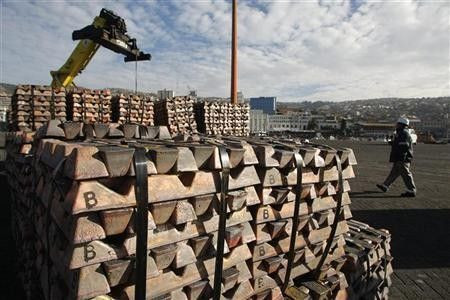Zambia lifts metal exports ban after two days

Zambia has lifted a ban on metal exports, just two days after imposing it to sort out irregularities and increase transparency in Africa's top cooper producer, a minerals ministry official said on Thursday.
Newly elected President Michael Sata has been concerned -- analysts say with good reason -- that copper exporters are misreporting the amount of ore leaving Zambia. Earlier this week Zambia suspended export permits to put new guidelines in place.
Sata said last week all export payments would need to be routed via the central bank, a move seen as adding more oversight to an industry providing the life blood of the economy.
The suspension has been lifted. The job has been done. We don't need 10 years to do the job, Godwin Beene, mines permanent secretary, told Reuters.
Information minister Given Lubinda told reporters another reason why the suspension was lifted was because it would take time to come up with new guidelines.
The mines ministry initially said it would need until October 16 to put new measures in place, but mines were able to resume loading trucks on Thursday, logistics sources said.
The chamber of mines, which represents foreign miners, welcomed the lifting of the suspension.
It was too long and was definitely going to hurt the mining companies. With this reversal the impact will be minimal, said Frederick Bantubonse, its general manager.
We haven't been given the reasons for the reversal, but we can all guess, he added.
Details of the new procedures were not immediately clear.
The new measures will come into effect when the Bank of Zambia is ready. For now exports will continue to be guided by the existing Mines and Minerals Development Act, Beene said.
WAIT AND SEE
Copper accounts for three-quarters of Zambia's export earnings, but the mining industry contributes only about 10 percent of tax revenue.
Sata, 74, has wasted no time in removing all vestiges of the administration of Rupiah Banda, whose Movement for Multi-party Democracy (MMD) had been in charge of the southern African nation for 20 years.
He said on Monday he would dissolve the boards of four state-owned companies -- Zesco, National Pensions Scheme Authority, Zambia Revenue Authority and Bank of Zambia.
Last week, he disbanded the board of the Energy Regulation Board, appointed a new head of the country's anti-corruption agency and fired respected central bank governor Caleb Funadanga.
Analysts said some of the drastic moves imposed by Sata's government in only a week may unnerve investors.
It is fortuitous that since Sata has come in the copper price has dropped like a stone, so there is limited damage he can cause, a London-based analyst said.
Zambia's mining industry aims to double annual copper output to 1.5 million tonnes by 2016, and Sata, who swept to power on the back of voters looking for a bigger share of mining profits, is likely try to wring more revenue from it.
Analysts said foreign firms should brace for labour strife.
Mining unions will push harder than usual for double-digit raises, albeit from a low base, Philippe de Pontet, an analyst at political risk consulting firm Eurasia Group, said in a note.
In an example of what may be looming for the sector, about 2,000 Zambian workers at NFC Africa Mining, majority-owned by China Nonferrous Metals Mining, went on a strike for higher wages, catching management and their own union by surprise.
Copper producers operating in the country include Canada's First Quantum Minerals, London-listed Vedanta Resources, Glencore International AG and Metorex of South Africa.
Data shows much of the exported copper is destined for Switzerland, but little of it shows up in Swiss customs figures, raising questions about transparency.
© Copyright Thomson Reuters 2024. All rights reserved.





















